AARP Eye Center

By Susannah Nesmith
Bernardo and Fabiola Hernandez went to Unidad of Miami Beach, a community-based service organization, looking for help.
Fabiola, 70, clutched a folder of documents that showed she and her husband receive only $51 a month in food stamps. A printout listed their combined monthly Social Security benefits of just $1,317.
But the most critical evidence of their need was their doctor’s warning: They were both anemic.
“We only eat meat once a month,” said Bernardo, 73. “After all our bills, the rent, the car insurance, we don’t have enough left to eat.”
About 1 in 6 Florida residents 50 and older risk hunger due to a lack of resources, according to a survey conducted this year by the University of Central Florida and AARP Foundation.
The foundation sponsored the survey after AARP Florida cosponsored a Senior Hunger Summit and discovered that more reliable data was needed.
The survey results mirror findings nationwide. A 2012 survey by the National Foundation to End Senior Hunger found that 15.3 percent of people 60 and older were at risk of hunger and that the overall number had increased by roughly half since the recession began in 2008.
Many older people who aren’t ready to retire say the economy has pushed them into poverty.
Oscar Diaz, 60, of Miami Beach, is participating in a retraining program for unemployed older people at Unidad. He and his wife both lost their jobs more than a year ago. Before his wife recently found work, scraping together enough money for food was difficult.
“We just added a little more water to the beans,” he said. “For Christmas … we get those free turkeys. If we can get little freebies here and there, that helps.”
AARP Foundation teamed up with the Miami Dolphins, including several former players, on a recent Saturday to pack 1 million nutritious, high-protein meals for local food banks. But social service providers say the need keeps growing.
Funding isn’t keeping up
Mark Adler, executive director of Broward Meals on Wheels based in Plantation, set up a waiting list for the first time in 30 years last year. His agency, which feeds 10,000 seniors annually, has about 200 on the waiting list.
“What do I need? I need more funding,” Adler said. “The need is exponentially growing and the funding is stagnant, not keeping up with the growing senior population.”
Much of the money for Meals on Wheels comes through the Older Americans Act, but the AARP Public Policy Institute found that federal funding has been relatively flat for a decade. Over that same period, the population it is intended to serve has grown 30 percent.
Many of Adler’s clients are like Patricia Clark, 85, of Plantation. A widow, she lives alone with no family nearby. Though she bought her condo with cash when she retired, she has had to mortgage it to supplement her Social Security. In recent years she has suffered a series of severe health problems, including a broken hip and a broken back.
She’s struggling to pay her mortgage, the condo maintenance fee and the copayments from her latest hospitalization. Without the weekly Meals on Wheels delivery, she’s not sure how she would eat.
“I’d just have to give up something, I guess,” she said, adding that her weight has dropped from 120 pounds to 97 in recent years and her doctors want her to eat more.
Just being at risk of hunger has health consequences, noted Jennifer Sauer, senior research advisor at the AARP Research Center. Thirty percent of the survey respondents who qualified as at risk under the U.S. Department of Agriculture definition said their health was fair or poor, compared with 16 percent of all Floridians.
Hunger affects all ages. The AARP survey found that 18 percent of Floridians are at risk of going hungry. Broward Meals on Wheels helped serve 27,000 meals to 937 needy children last summer.
“I figure if you do something well, by all means, do more of it,” Adler said.
Susannah Nesmith is a writer living in Miami.























































